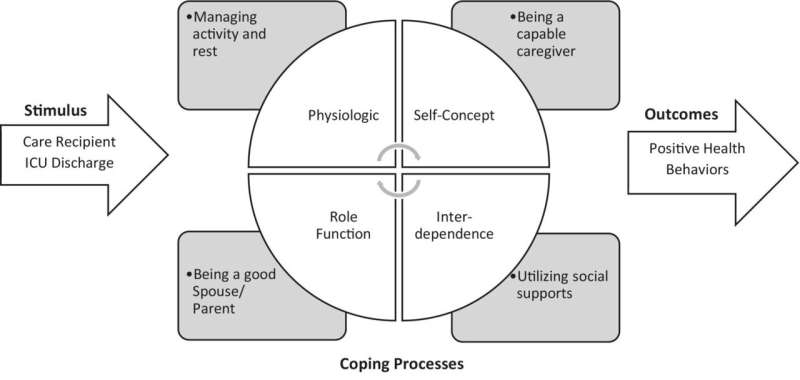Family members caring for COVID patients after ICU discharge face unique challenges

Roughly 21% of hospitalized COVID-19 patients at the height of the pandemic required an intensive care stay and the bulk were cared for by family upon discharge. However, not much is known about how these caregivers and patients adapted.
To learn more, University of Michigan researchers surveyed COVID-19 ICU patients who were hospitalized in Southeastern Michigan between the start of the U.S. pandemic and October 2020. Researchers interviewed 32 patients after discharge, along with 32 caregivers.
Findings suggest COVID-19 presents caregivers with unique challenges not evident in other patients. Data also confirm previous research that, in general, the bulk of family caregiving falls to women, with 75% of the COVID-19 caregivers in the study identifying as female and 75% of patients identifying as male.
COVID-19 and cognitive changes
Six themes emerged and three were unique to COVID: managing infection, engaging support services and patient independence.
"The desire to be independent is definitely something that we would likely see across many disabling illnesses," said Sheria Robinson-Lane, assistant professor at the School of Nursing and the study's first author. "However, the cognitive changes that can occur with a severe COVID-19 infection are perhaps more unexpected for families, not usually discussed, and can make caregiving ... extra stressful."
Managing infection was especially challenging before vaccines and other treatments because patients were so sick and COVID is highly transmissible, Robinson-Lane said. Caregivers, at risk for infection themselves, were forced to balance their self-care needs with potential risks to public health.
"We had to keep family and friends away ... with the lungs still healing, we just couldn't take that chance," one caregiver said. "Even when I go into work I'm isolated. I stay away from people."
The most frequently used home care services were nursing support and occupational and physical therapy. One patient said: "Twice a week, I do leg exercises and stuff like that. After-hospital care was a great thing. You need it. You need it."
Robinson-Lane said caregivers had to manage their own COVID-related illness, were not always allowed at bedsides and had to deal with continued isolation after discharge.
Other themes included engaging family and friend support, managing emotions and increased responsibilities due to caregiving.
Identifying dependable helpers before a diagnosis is key
"In this work, we did learn a lot about how to help prepare families for a COVID-related hospitalization and developed a related toolkit for families available through Michigan Medicine," Robinson-Lane said. (Files are also available upon request for other health systems.)
"One of the major takeaways is that families perhaps need more realistic expectations about what life after discharge might look like," she said. "The person that went into the ICU is often going to be very different from the person who comes home—and these changes might last a lot longer than expected. Understanding this and having the right support when your relative returns home can make a huge difference for how the family adjusts."
Other major takeaways include:
-
Identify your circle. Make a list of reliable helpers among friends and family before a diagnosis.
-
Schedule a check-in from the hospital or an insurance case manager to make sure the families have necessary supplies and resources.
The study appears in the Journal of Clinical Nursing.
More information: Sheria G. Robinson‐Lane et al, Caregiving in the COVID ‐19 pandemic: Family adaptations following an intensive care unit hospitalisation, Journal of Clinical Nursing (2022). DOI: 10.1111/jocn.16560

















